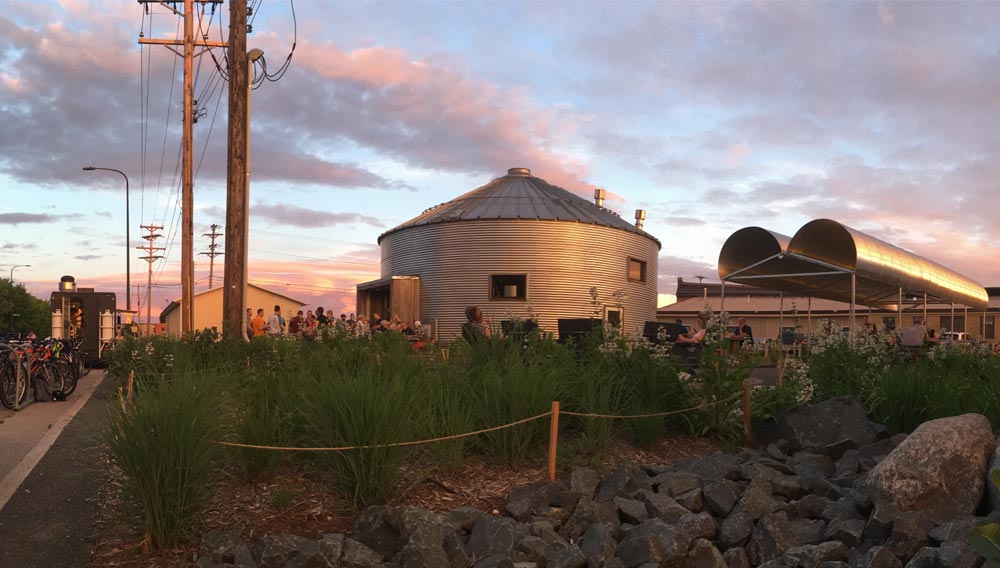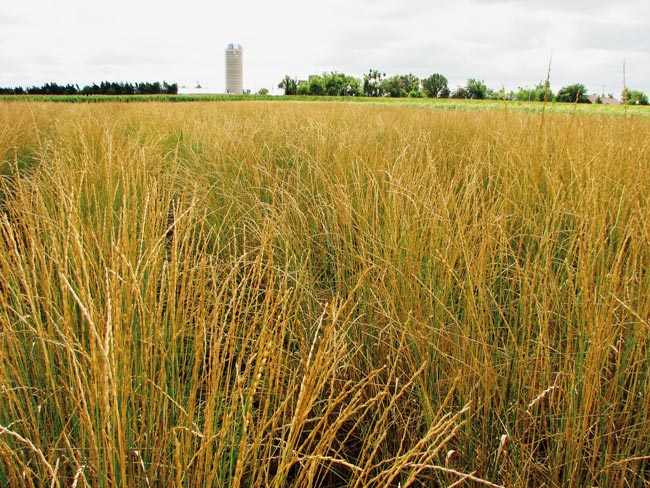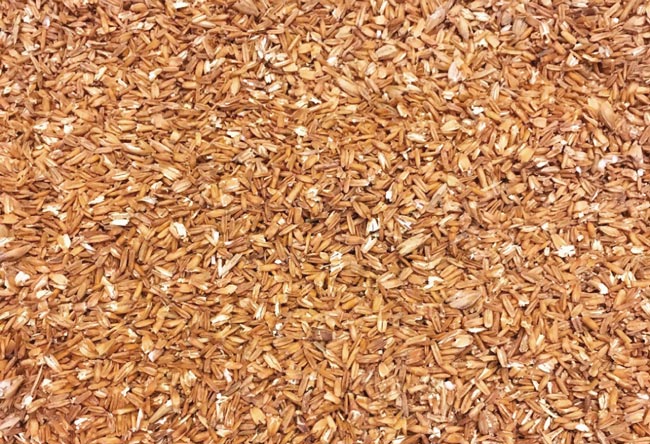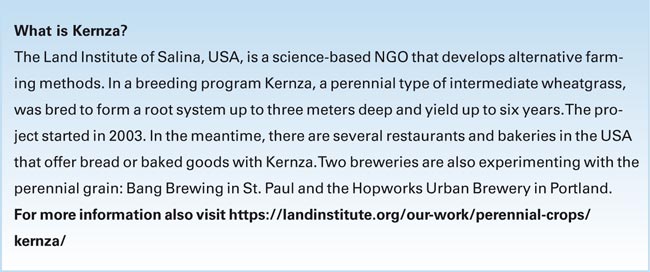Brewing with perennial crops
May I introduce: Kernza! | Climate change poses increasing challenges for agriculture – we will need to employ creative solutions in the future. One of them could be perennial grain crops, which are still not very common in brewing. Promoting this method requires bold pioneers who lead by example. Sandy Boss Febbo, founder of Bang Brewing in St. Paul, USA, and her husband Jay, co-owner and co-brewer, are such pioneers. Sandy uses Kernza® for her beers, a newly bred species of reticulum that forms a root system up to three meters deep and remains fertile for up to six years. BRAUWELT International spoke to her about the peculiarities of this perennial grain crop and about the corporate philosophy of her brewery.
How did you come across Kernza?
Sandy Boss Febbo: We were introduced to Kernza through Chef Marshall Paulsen of Birchwood Cafe in Minneapolis – one of the pioneers in working with the grain in baking. The Birchwood team had been working with Kernza for a while and in February of 2017 he asked if we would be interested in trying to brew with it (to which I replied
with a resounding “Yes!”). He then introduced us to the teams at The Land Institute and Green Lands Blue Waters – and so it began.
And when did you start using Kernza for your beers?
S. Boss Febbo: We brewed our first batch in May of 2017. The Land Institute requested we brew a special Kernza beer to release during their annual meeting at a special event which we hosted at our brewery in July 2017. We brewed a Kernza Blonde Ale, Gold, cheekily named for our alma mater, the University of Minnesota, which grew the grain we used to brew. The name is also a nod to the fact that we think The Land Institute has struck gold with this perennial grain.
Gold features just over 15 % Kernza with the balance of the grain bill an organic brewers malt from US maltster Briess. Kernza’s reputation for an earthy, grassy flavor was one that the research team wasn’t convinced would lend well to beer though we wanted to develop a recipe that would feature the grain in a nicely balanced ale and allow us all to better understand its flavor profile and brewing potential.
We have produced three other Kernza beers since and have additional recipes in development. It really is a beautiful grain.
Where do you get your Kernza from, and how do you process it? There will probably be some peculiarities concerning the brewing process…
S. Boss Febbo: To date all of our organic Kernza has been grown by the University of Minnesota. The seed is too small to be malted though – it’s the size of grass seed. We request the Kernza seed that is provided to us to be cleaned and dehulled. We then use our roller mill on site to give the raw grain a slight roll, or crush. Since the grain we use is raw we treat it in a similar fashion to raw wheat – utilizing the enzymes from a 2-row malted barley for the conversion.
Up to now, we have used 7-15 % Kernza in our various recipes to avoid any concern of a stuck mash. The Food Science team at the University is researching best options to flake the grain for use in brewing.
You mentioned the earthy flavor of Kernza. How does this transfer to the beer?
S. Boss Febbo: Yes, Kernza has a distinctly earthy flavor profile which transfers very well to the beer. We have noticed some flavor variation based on grain origin – some of our lots have hailed from southern Minnesota, others from the north. The deep roots of this perennial grain deliver a distinct terroir – really special.
What other beers do you have in your portfolio and how do your customers rate Kernza beer compared to the others?
S. Boss Febbo: We brew a range of high quality all-organic ales and lagers and have featured Kernza in four different ale recipes to date. Our customers have been really receptive to Kernza, not only for its experimental intrigue and environmental benefit – its flavor has been very well received.
How big is the output of your brewery per year, and what is the share of Kernza beers?
S. Boss Febbo: We currently produce 250 bbls (300 hl) per year, and more each year! Currently we are able to produce approximately 50 bbls (60 hl) of Kernza beer per year – that is strictly due to the limited availability of the grain. Most of the seed is still going back into planting.
Your brewery has been around since 2013. How did you become a brewer, and when did you come up with the idea to start your own brewery?
S. Boss Febbo: Jay and I have been small batch brewing since the mid 1990s. As our interest in brewing continued to grow, and our interest in exiting our corporate lives began to take hold, we determined to establish our own business in 2007 and spent years in planning (and saving!) before breaking ground on our joint venture. We began as a two-person team managing all aspects of our brewery including taproom and distribution ourselves. We have since grown to a tight team of seven!
You work in an unusual building: a grain silo …?
S. Boss Febbo: When we set out to establish our brewery we intended to repurpose an existing space in our home town of Saint Paul. Two years of searching proved we were not able to find a small-scale space suitable to our needs – determined, we estimated build-outs at two different existing properties and then looked at the cost, and then at each other, and said we could build what we want for that amount and not be in a position where we’re investing substantially in someone else’s property and then renegotiating our lease in five years.
In our search for an existing space we found this undeveloped parcel of land and decided to pursue a custom build with the goal of keeping our material use to a minimum. We worked with the team at Alchemy Architects which specializes in small space, flex-use, pre-fab design – and here we are! We have a highly-efficient pre-fab building with many repurposed materials and a great iconic visual tie to the organic farms that make possible the beers we produce, It’s awesome.
What kind of equipment do you use?
S. Boss Febbo: We brew on a 10 bbl (12 hl) two-vessel brew house by JVNW and brew 1:1 – our cellar is comprised of 10 bbl (12 hl) JVNW tanks. Our beers are all crafted without the use of finings, they are unfiltered, unpasteurized, and naturally carbonated. We take our time and often refer to our product as “slow beer” as a nod to the slow food movement. We currently brew 250 bbls (300 hl) annually and have capacity to expand our cellar – we are currently researching some fun ideas which will likely come to fruition within the next year. We keg our beers in 1/6 bbl (20l) and 0,5 bbl (60l) Schaefer ecokegs and with an HDP bottler we package 64oz growlers for taproom and 750 ml returnable glass bottles for taproom and retail accounts.
Where do you sell your beers?
S. Boss Febbo: Most of our beer is sold on premise – either for consumption in our taproom and beer garden or bottles to go. We self-distribute kegs to 10-12 tap accounts and 750 ml returnable bottles to 11 liquor stores – all in Saint Paul and Minneapolis.
On your website you describe the goal of Bang Brewing: biggest impact, smallest footprint. Please tell us more about your sustainability approach.
S. Boss Febbo: Our scale is truly one of lifestyle brewing. We specifically designed our facility to allow us to remain involved in all aspects of our business (sourcing our ingredients, knowing our farmers, brewing, cellaring, packaging, and being present during taproom hours – all while maintaining the business side of accounting, licensing, payroll, PR, social channels, etc.). Having our arms around all of it from the day we opened has allowed us grow it and shape it in a thoughtful way – each business decision is an opportunity to consider our environmental and social impacts and be diligent about our approach. Our business scale is small, yet designed to thrive. From 1300 sqft (121 m2) we intend to accomplish a lot! We think we can achieve more with less and aim to be an example.
All your beers are brewed with organic raw materials. How easy or difficult is it to obtain organic raw materials in the US? How big is the organic farming movement there?
S. Boss Febbo: Sourcing all organic ingredients has been a certain challenge though our options increase every year. We often reference that our ingredient crayon box is smaller than conventional brewers – which it is – though it’s a constraint we welcome as we work to prove demand. We need to reach further than we would like in order to buy organic ingredients though do so now with the ultimate goal of being able to source more organic ingredients closer to home. The organic farming movement in the US is growing and we are working diligently to prove demand and help network.
You are initiating the Organic Brewers Alliance. Please tell us more about this project and your partners.
S. Boss Febbo: We are just launching this initiative – currently taking names (S. Boss Febbo smiles). Our goal is to map every brewery worldwide that is brewing with organics so we can establish a network of brewers that will further prove demand and support for sustainable and regenerative farming. We want to collectively share resources, connect our various partners, and to lay the groundwork for cooperative purchasing where possible. Our ultimate goal is to help each other broaden ingredient options and make it easier for other brewers to source organic ingredients – not all are able to dedicate extensive time to sourcing so we want to make it easier to opt in. We’re just getting ready to announce founding partners this summer – including a maltster for small batch specialties and a midwest hub to assist in distribution for cooperative purchasing. Initial efforts will be focused on brewing ingredients though long-term plans will extend to environmentally focused business partners running the range from insurance to swag/gear and beyond.
The interview was conducted by BRAUWELT International editor Lucia Baier.
Authors
Lucia Baier
Source
BRAUWELT International 3, 2019, page 178-181








